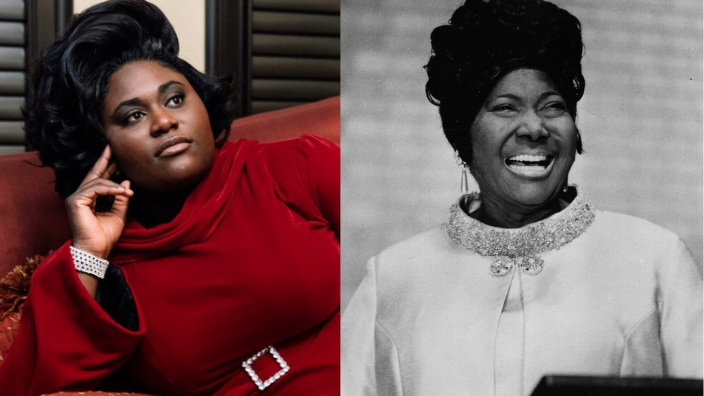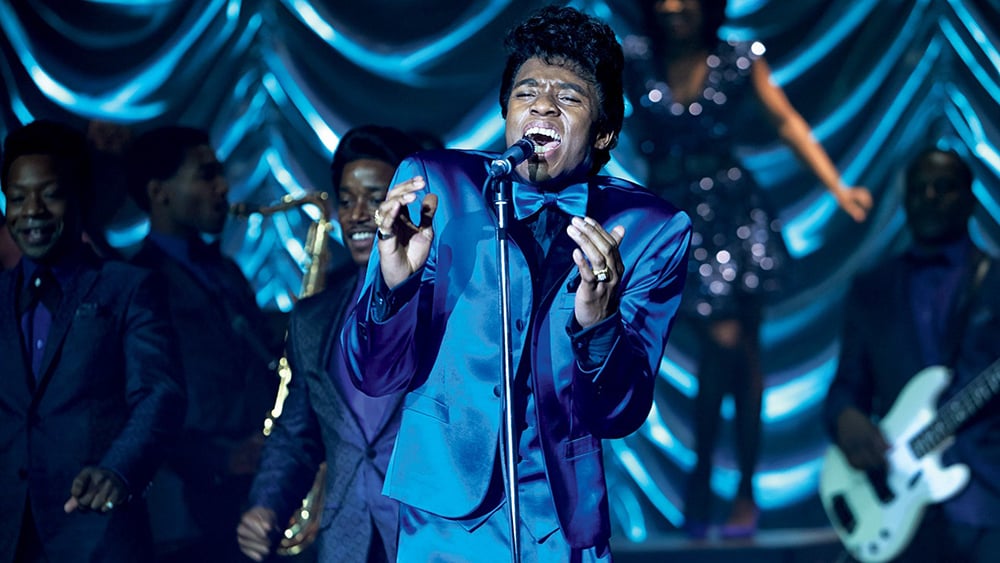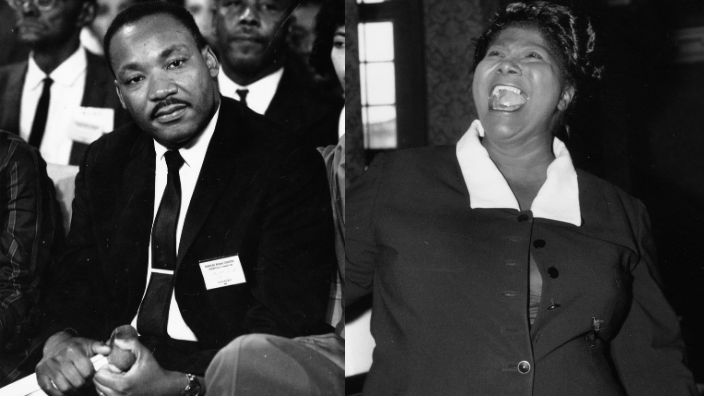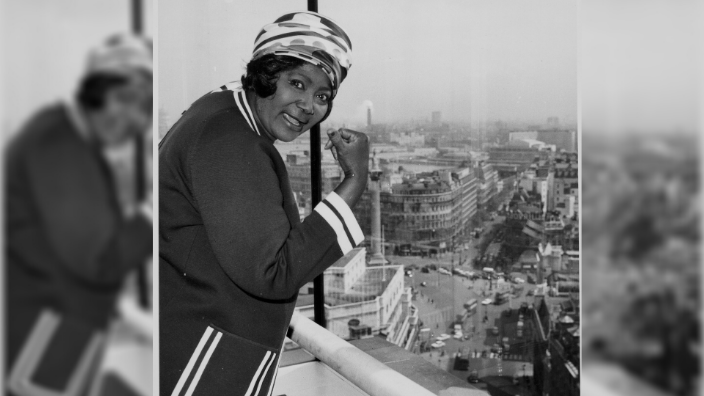Danielle Brooks says Mahalia Jackson’s hysterectomy was ‘necessary’ to include in biopic
EXCLUSIVE: Brooks stars in and serves as co-executive producer in Lifetime's 'Robin Roberts Presents: Mahalia'
Mahalia Jackson is heralded as one of the most influential singers of the 20th century. The gospel legend’s soulful voice both comforted and galvanized African Americans during the Civil Rights Movement against America’s racist Jim Crow era.
And while Jackson, who died in 1972, is praised as a major influence to singers in both gospel and R&B, the story of her life and career has only been vaguely told through limited portrayals of her in documentaries and films like Selma.
Read More: Danielle Brooks talks playing Mahalia Jackson in new biopic
Now, Mahalia Jackson’s full story is being told in Lifetime‘s Robin Roberts Presents: Mahalia, which stars SAG Award-and Grammy Award-winning actress/singer Danielle Brooks.

Brooks, 31, who also serves as executive producer alongside Robin Roberts and Broadway great Kenny Leon, says the idea for her to portray Mahalia Jackson came from her former The Color Purple on Broadway co-star Jennifer Hudson and Dreamgirls legend Jennifer Holliday.
“Jennifer Hudson and Jennifer Holliday both came to my dressing rooms on separate occasions and said, ‘You remind me of Mahalia Jackson.’ And that’s when the bug got dropped in my ear,” Brooks tells theGrio in an exclusive interview with Managing Editor Gerren Keith Gaynor.
Brooks, who grew up in the church in South Carolina, felt embodying such a gospel giant would ultimately be a good fit. The Emmy-nominated actress said she always had a desire to portray a legend, especially after witnessing the late Chadwick Boseman in the role of Godfather of Soul, James Brown, in Get On Up.

“I was just so in awe of his performance. And I just was like, I really hope I can play a living legend or a legend one day,” said Brooks.
Playing the role of Mahalia Jackson, who broke barriers as the first gospel singer to perform at Carnegie Hall and helped integrate American audiences, is no easy feat when you consider the power of her voice. Brooks said she and Leon worked tirelessly in the studio to make sure she captured the essence of Mahalia Jackson’s commanding and soulful vocal prowess.
Read More: Danielle Brooks admits she felt ‘shame’ after not bouncing back from 60lbs of baby weight
At one point, she even had Leon call his mother for feedback. “I said, call your momma because she lived during [the time] when Mahalia was around and he called her and she listened and she said, ‘It ain’t got the gut yet,'” Brooks recalled.
“So we went back into the studio and kept cooking until we found it. I’m grateful that we took that time before shooting … because she is the queen of gospel music. You can’t just walk in there blindly thinking you’re just going to do it. So we took the proper time to do it right.”
Some audiences might not know that in addition to being a successful recording artist who sold an estimated 22 million records throughout the span of her lifetime, Mahalia Jackson was also a prominent figure in the Civil Rights Movement and was a close friend and confidant to Dr. Martin Luther King Jr. Jackson even played a role in making King’s iconic “I Have A Dream” speech the powerful oration it became when she famously yelled out to him, “Tell ’em about the dream, Martin!” during the March on Washington in 1963.
Robin Roberts Presents: Mahalia artfully portrays Jackson and King’s closeness, something Brooks believed was rooted in their needing of each other to “survive.”
“They both were married to their partners, but sometimes God will just bring people in your life to help you through the next — and I think that’s what they were for each other,” she said.
Read More: 7 inconvenient truths white people must understand about Martin Luther King Jr.

“She needed his ministry. She needed his words, and I would probably go as far as to say that nobody could hit her heart the way that Martin could. And I don’t think anybody probably sang the way that she did that really touched his soul. That’s why he asked her to go with him to a lot of these events and bus boycotts and things like that, because the way she moved him.”
The Lifetime biopic also touches on Mahalia Jackson’s health battle with fibroids and sarcoidosis that led to a hysterectomy, which prevented the singer from bearing children. That relatively unknown part of her life is something Brooks, as co-executive producer, said she worked to include in the film.
“It actually wasn’t written in the script to talk about the hysterectomy and to talk about her struggles with wanting to become a mother. And I felt it necessary,” said Brooks.
“I really wanted to explore the human parts of her. And that was one of them that I totally related to. And it was difficult to shoot because I’ve had my own journey. That has not always been easy with becoming a mother.”
Read More: Black mom on premature birth, racial disparities in maternal health: ‘I carry that with me’

“There are so many women, and I would go as far as to say, every woman has their journey with being a mother; whether they want to be one, whether they can’t be one, whether they have lost children during birth or have thyroids or whatever,” she added. “We all go through a journey. And I just felt it important to highlight it because I haven’t seen enough of it, especially as women of color.”
The film also highlights the racism in the medical industry at the time that made it difficult for Black women to get the proper care they needed — an issue in medicine that prevails today and has been recently magnified by the coronavirus pandemic.
Brooks emphasized how “difficult” it was to “go through health issues as a Black person during that time,” adding “I feel like a lot of times we were kind of like guinea pigs in a way.”
Ultimately, Brooks said she hopes audiences take away the sacrifice of Mahalia Jackson and the doors she opened for Black performers and entrepreneurs — in addition to the hope she gave to a Black America that was afflicted by white supremacy.
“The things that I’ve been able to do now was because of her sacrifice of saying, you know what, I’m going to be uncomfortable in this place,” she said. “People might say some messed up stuff to me, but I’m going to rise above it and be in this room. And so I think she left her legacy in that way to push things forward.”
‘Robin Roberts Presents: Mahalia’ which premieres on Lifetime April 3 at 8 p.m. EST.
Have you subscribed to theGrio’s podcast “Dear Culture”? Download our newest episodes now!
TheGrio is now on Apple TV, Amazon Fire, and Roku. Download theGrio today!
